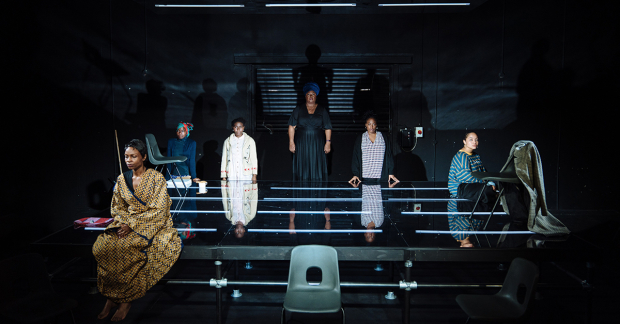Review: for all the women who thought they were Mad (Hackney Showroom)
Zawe Ashton’s new play runs in a pop-up theatre in Stoke Newington Town Hall

© Helen Murray
As an actor, Zawe Ashton is spending the autumn performing in the Broadway transfer of Harold Pinter's Betrayal. As a playwright, she's drawing audiences in London, as for all the women who thought they were Mad – her fourth play, and one that has taken 11 years to stage – runs in Stoke Newington.
The play is as hardworking and multifaceted as Ashton, who is a filmmaker, poet and novelist alongside being an actor and playwright. Its themes include the legacy of colonialism, the experiences of black women in Britain today, mental health, gender, motherhood and intergenerational trauma. These are explored through a mixture of poetry and scenes that seem naturalistic, but that assume a dreamlike quality as they unfold. So, there's a lot going on. While the play is sly and smart when you've got time to puzzle over the script at home, on stage it is frustratingly oblique and hard to follow.
The central character is Joy (Mina Andala), an office worker in a 40-storey building. She's doing well professionally: in an early scene, her boss tells her she's up for promotion. But the Greek chorus-like group of five women and a young girl who ominously prefigure her fate ("why couldn't we stop it?") suggest a sadder story. Her mental health noticeably disintegrates after traumatic experiences such as witnessing a suicide at her office, and having a miserable time of early motherhood. There are also nods to an underlying sense of dislocation, on account of tricky conversations about 'home' with her mother and an office cleaner who, it turns out, comes from the same African village as Joy.
Under Jo McInnes's direction, Jumoké Fashola has a vibrant, characterful turn as Joy's ostentatiously god-fearing mother. Meanwhile, Joy Elias-Rilwan is fun as the straight-talking, mischievous cleaner. The writing has punchy moments too, such as its skewering of insidiously racist comments made by white people (Joy's white, male boss, for instance, tells her that "a lot of women, like you, smell of coconut").
However, overall the characters and performances are, respectively, thinly drawn and underpowered. The venue – Hackney Showroom has created a pop-up stage in the expansive environs of Stoke Newington Town Hall – seems an ill-suited home for an intimate play like this. But the design from Natalie Pryce and ULTZ is elegantly effective – Joy's scenes take place on a simple, neon-lit stage, around which the doomy chorus prowl.
for all the women who thought they were Mad has vital points to make – about racial oppression in modern Britain, mental health and the importance of storytelling, in particular. If only they were conveyed with greater clarity.


















